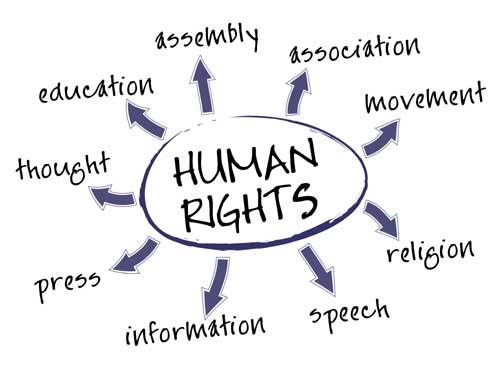Human Rights and The Indian Constitution
The Constitution of the Republic of India which came into force on 26th January 1950 with 395 Articles and 8 Schedules, is one of the most elaborate fundamental laws ever adopted. The Preamble to the Constitution declares India to be a Sovereign, Socialist, Secular and Democratic Republic. The term ‘democratic’ denotes that the Government gets its authority from the will of the people. It gives a feeling that they all are equal “irrespective of the race, religion, language, sex and culture.” The Preamble to the Constitution ledges justice, social, economic and political, liberty of thought, expression, belief, faith and worship, equality of status and of opportunity and fraternity assuring the dignity of the individual and the unity and integrity of the nation to ail its citizens.
There are six Fundamental rights described below:
- Right to equality (Article 14-18)
- Right to freedom (Article 19-22)
- Right against exploitation (Article 23-24)
- Right to freedom of religion (Articles 25-28)
- Cultural & educational rights (Articles 29-30)
- Right to constitutional remedies (Article 32)
Right To Equality (Article 14-18)
Article 14 (Equality Before Law)
- Article 14 says that state shall not deny to any person equality before the law or the equal protection of the laws within the territory of India.
- Art. 14 is available to any person including legal persons viz. statutory corporation, companies, etc.
- Art. 14 is taken from the concept of equal protection of laws has been taken from the constitution of USA.
- The concept of the rule of law is a negative concept while the concept of equal protection of laws is a positive concept.
- The concept of equality before the law is equivalent to the second element of the concept of the ‘rule of law’ propounded by A.D. dicey, the British jurist. But certain exceptions to it are, the president of India, state governors, Public servants, Judges, Foreign diplomats, etc., who enjoy immunities, protections, and special privileges.
Article 15 (Prohibition of discrimination on the grounds of religion, race, caste, sex or place of birth):
- Article 15 says that the state shall not discriminate against only of religion, race, sex, place of birth or any of them.
- Under Article 15 (3) & (4), the government can make special provisions for women & children and for a group of citizens who are economically and socially backward.
Article 16 (Equality of opportunities in matters of public employment):
- Article 16 says that there shall be equality of opportunity for all citizens in matters relating to employment or appointment to any office under the state.
Article 17 (Abolition of Untouchability):
- Article 17 says that Untouchability is abolished and its practice in any form is forbidden. The enforcement of any disability arising out of untouchability shall be an offense punishable by law.
Article 18 (Abolition of titles):
- Article 18 says that no title, not being a military or academic distinction, shall be conferred by the State. No citizen of India shall accept any title from any foreign state.
- The awards, Bharat Ratna, Padma Vibhuhan, Padma Bhusan and Padma Shri, called as The National Awards would not amount to title within the meaning of Article 18(i).
Right to freedom (Article 19-22)
Article 19 (Protection of certain rights regarding freedom of speech, etc.):
Article 19 says that all citizens shall have the right
- To freedom of speech and expression.
- To assemble peacefully and without arms.
- To form associations or unions.
- To move freely throughout the territory of India.
- To practice any profession or to carry on any occupation, trade or business.
Article 20 (Protection in respect of conviction for offenses):
Article 20 says that state can impose reasonable restrictions on the groups of security of the state, friendly relations with foreign states, public order, decency, morality, contempt of court, defamation, etc.
Article 21 deals with Protection of life and personal liberty.
Article 21A states that that state shall provide free and compulsory education to all children of the age of 6-14 years.
Article 22 deals with protection against arrest and detention in certain cases.
Right against exploitation (Article 23-24)
Article 23 deals with the prohibition of traffic in human beings and forced labour.
Article 24 deals with prohibition of employment of children in factories, etc.
Right to freedom of religion (Articles 25-28)
Article 25 deals with freedom of conscience and free profession, practice, and propagation of religion.
Article 26 deals with freedom to manage religious affairs.
Article 27 deals with freedom as to payment of taxes for promotion of any particular religion.
Article 28 deals with freedom as to attendance at religious instructions or religious worship in certain educational institutions.
Cultural & educational rights (Articles 29-30)
Article 29 deals with the protection of language, script, and culture of minorities.
Article 30 deals with the right of minorities to establish and administer educational institutions.
Right to constitutional remedies (Article 32)
Article 32 deals with the right to move to the supreme court for the enforcement of Fundamental Rights including the Writs of (i) Habeas corpus, (ii) Mandamus, (iii) Prohibition, (iv) Certiorari and (iv) Quo warranto.

